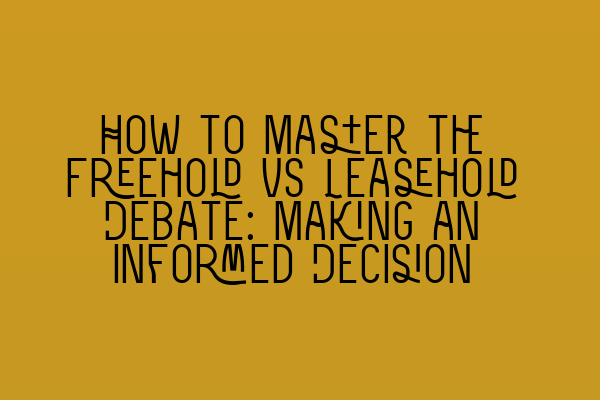How to Master the Freehold vs Leasehold Debate: Making an Informed Decision
When it comes to property ownership, one of the key decisions you will need to make is whether to opt for freehold or leasehold. Both options have their pros and cons, and it’s important to understand the differences before making a decision. In this article, we will delve into the freehold vs leasehold debate, providing you with the knowledge you need to make an informed choice.
The Basics: Understanding Freehold and Leasehold
Before we dive into the debate, let’s start by understanding what freehold and leasehold actually mean.
Freehold is the complete ownership of a property and the land it stands on. As a freeholder, you have full control over the property and are not bound by any time restrictions.
Leasehold, on the other hand, is a form of ownership where you own the property for a fixed period of time, known as the lease term. Typically, leasehold properties are owned for longer periods, often extending to several decades.
Now that we’ve covered the basics, let’s explore the factors you should consider when making your decision.
1. Long-term vs Short-term Investment
If you’re in it for the long haul, freehold is often considered the better option. With a freehold property, you have complete ownership and control, making it a valuable long-term investment. You can make changes to the property, sell it at any time, and leave it as an inheritance for future generations.
On the other hand, if you’re looking for a short-term investment or are unsure about the long-term plans, leasehold might be more suitable. Leasehold properties are often more affordable upfront, making them an attractive option for those on a tight budget.
2. Maintenance and Repairs
Another crucial aspect to consider is the responsibility for maintenance and repairs. With freehold, you are solely responsible for the upkeep of the property and any associated costs. This means you have full control over the maintenance schedule and can choose your contractors.
With leasehold, however, the responsibility often lies with the landlord or management company. This can relieve you of the burden of maintenance but may come at an additional cost since you’re essentially paying for these services through your ground rent and service charges.
3. Control and Restrictions
When it comes to control over your property, freehold offers the most freedom. You have the power to make any alterations or extensions to the property, subject to planning permissions and building regulations. You are not bound by any external restrictions or regulations.
Leasehold properties, however, may come with restrictions imposed by the lease agreement. These restrictions can cover matters such as pet ownership, subletting, or even the color you can paint your front door. It’s crucial to thoroughly review the terms of the lease and seek legal advice before committing to a leasehold property.
4. Costs and Financial Considerations
Finances play a significant role in the freehold vs leasehold debate. Freehold properties generally involve higher upfront costs compared to leasehold properties. However, as a freeholder, you won’t need to worry about annual ground rent or service charges.
Leasehold properties, on the other hand, usually come with annual ground rent and service charges. It’s important to consider these ongoing costs when budgeting for a leasehold property. Additionally, if the lease term is approaching expiry, you may also need to extend the lease at an additional cost.
5. Resale Value and Mortgageability
Finally, it’s essential to consider the resale value and mortgageability of the property. Freehold properties are often seen as more desirable and tend to retain their value better over time. Lenders also generally find freehold properties to be less risky and more mortgageable.
Leasehold properties, especially those with shorter lease terms, may be more challenging to sell. Mortgage lenders may also have stricter criteria when it comes to leasehold properties, particularly if the lease term is relatively short.
Conclusion: Making an Informed Decision
Choosing between freehold and leasehold is a personal decision that depends on various factors, including your long-term plans, financial situation, and lifestyle preferences. By considering the points discussed in this article, you can make an informed decision that aligns with your goals and circumstances.
If you’d like to delve deeper into the world of property law, our related articles can provide you with valuable insights:
- SQE Contract Law: Analyzing Landmark Cases and Influential Judicial Decisions
- Understanding Contractual Capacity: Rights and Limitations
- Interactive SQE Mock Tests for Contract Law: Test Your Knowledge
- Join Our SQE Contract Law Webinars: Expert Insights and Guidance
- SQE Prep: Mastering the Essentials of Contract Law
